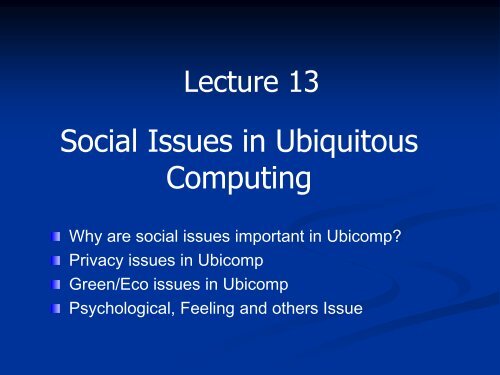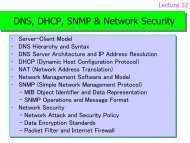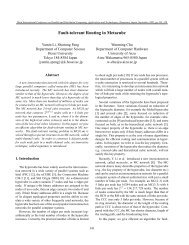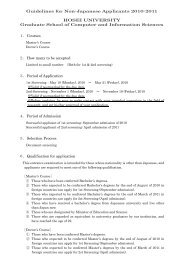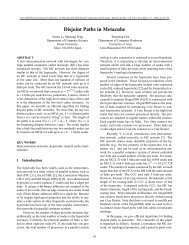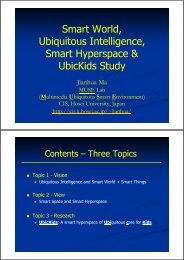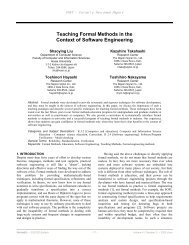Social Issues in Ubiquitous Computing
Social Issues in Ubiquitous Computing
Social Issues in Ubiquitous Computing
You also want an ePaper? Increase the reach of your titles
YUMPU automatically turns print PDFs into web optimized ePapers that Google loves.
Lecture 13<br />
<strong>Social</strong> <strong>Issues</strong> <strong>in</strong> <strong>Ubiquitous</strong><br />
Comput<strong>in</strong>g<br />
Why are social issues important <strong>in</strong> Ubicomp?<br />
Privacy issues <strong>in</strong> Ubicomp<br />
Green/Eco issues <strong>in</strong> Ubicomp<br />
Psychological, Feel<strong>in</strong>g and others Issue
Implications/Facts of Ubicomp<br />
• Invisible Computers/Devices Everywhere<br />
• 7 Billions People x 1,000 = 7 Trillions (10 12 ) computers/devices<br />
• Pervasive Networks/Communications/IoT Everywhere<br />
• 7T x 150 Messages/day > 10 15 messages (1P) per day<br />
• Information Sens<strong>in</strong>g/Monitor<strong>in</strong>g Everywhere<br />
• 1T x 30KB/day x 365 > 10 19 Bytes (10 4 PB) per year<br />
• “Smart/Intelligent” Th<strong>in</strong>gs Everywhere<br />
• Weiser’s words <strong>in</strong> his last days<br />
“If the computational system is <strong>in</strong>visible as well as extensive, it becomes hard<br />
to know what is controll<strong>in</strong>g what, what is connected what, where <strong>in</strong>formation<br />
is flow<strong>in</strong>g, how it is be<strong>in</strong>g used, what is broken, what are the consequences of<br />
any given action (<strong>in</strong>clud<strong>in</strong>g simply walk<strong>in</strong>g <strong>in</strong>to a room). Ma<strong>in</strong>ta<strong>in</strong><strong>in</strong>g<br />
simplicity and control simultaneously is still one of the major open questions<br />
fac<strong>in</strong>g ubiquitous comput<strong>in</strong>g research.”<br />
- IBM System Journal, Vol. 38, No. 4, 1999.
Light & Shadow of Context-Awareness<br />
Input<br />
Context-Aware<br />
System<br />
Output<br />
But, what may happen<br />
if your context <strong>in</strong>fo is<br />
Context: gotten by others?<br />
• state of the user<br />
• state of the physical environment<br />
• state of the comput<strong>in</strong>g system<br />
• history of user-computer <strong>in</strong>teraction<br />
• others<br />
• Light: You get more and better services by us<strong>in</strong>g context <strong>in</strong>formation<br />
• Shadow: Your personal <strong>in</strong>formation may be leaked and used by others!!
Can Be Always/Really Smart?<br />
‣ Smartness features <strong>in</strong> general<br />
- Some k<strong>in</strong>d/level of <strong>in</strong>telligence, but softer, wider and flexible than “<strong>in</strong>telligence”<br />
- Anyth<strong>in</strong>g from real to e/virtual ones, but with emphases of real/physical ones<br />
- Felt relatively, not absolutely two co-exist facets: smart and stupid!<br />
- Complicated or abstruse philosophical, culture social, ethical and other implications<br />
Sound-aware System<br />
“Be Quiet” Rem<strong>in</strong>der<br />
Status/ absent<br />
Status/ attend<br />
Room 1 Room 2<br />
RFID<br />
Reader<br />
Room 3
<strong>Social</strong> <strong>Issues</strong> <strong>in</strong> Ubicomp<br />
• <strong>Social</strong> issues are matters which directly or <strong>in</strong>directly<br />
affect a person or many members of a society and are<br />
considered to be problems, controversies related to moral<br />
values, or both. - Wikipedia<br />
• Major social issues related to IT & Ubicomp<br />
• Civil Right (<strong>in</strong>formation access, exchange, etc.)<br />
• Crime (computer/cyber crime, etc.)<br />
• Disability Right (web accessibility, ubi-assistance, etc.)<br />
• <strong>Social</strong> Exclusion (comput<strong>in</strong>g for all users, etc.)<br />
• Privacy (personal identity, <strong>in</strong>formation, control, etc.)<br />
• Environments (green, eco, recycle, susta<strong>in</strong>able, etc.)<br />
• Ethics (moral risks, ethic pr<strong>in</strong>ciples for design & use, etc.)<br />
• Individual (psychology, personal behavior, growth, etc.)<br />
• …
RFID-related Privacy Problem<br />
Replacement hip<br />
medical part #459382<br />
Wig<br />
model #4456<br />
(cheap polyester)<br />
Books and Their<br />
Names<br />
xxx, yyy, zzz<br />
30 items<br />
of l<strong>in</strong>gerie<br />
1500 USD<br />
<strong>in</strong> wallet<br />
Serial numbers:<br />
597387,389473<br />
…
What is Privacy?<br />
• Privacy is the ability of an <strong>in</strong>dividual or group to seclude<br />
themselves or <strong>in</strong>formation about themselves and thereby<br />
reveal themselves selectively. – Wikipedia<br />
• considered <strong>in</strong>herently special or personally sensitive<br />
• sometimes related to anonymity, the wish to rema<strong>in</strong> unnoticed<br />
• may be voluntarily sacrificed, normally for perceived benefits<br />
• greatly varied depended up cultures, persons, situations, etc.<br />
• Types of Privacy<br />
• Physical – <strong>in</strong>trusions <strong>in</strong>to one's physical space or solitude<br />
• Informational – personal date collection, view, use, change, …<br />
• Right of Privacy<br />
• It is our right to keep a doma<strong>in</strong> around us, which <strong>in</strong>cludes all those th<strong>in</strong>gs that are<br />
part of us. The right to privacy gives us the ability to choose which parts <strong>in</strong> this<br />
doma<strong>in</strong> can be accessed by others, and to control the extent, manner and tim<strong>in</strong>g<br />
of the use of those parts we choose to disclose. - Yael Onn, et al, 2005.
Information Privacy<br />
“The desire of people to choose freely under what circumstances<br />
and to what extent they will expose themselves, their attitude and<br />
their behavior to others.”<br />
– Alan West<strong>in</strong>, 1967<br />
Privacy >> Secrecy!<br />
- M. Langhe<strong>in</strong>rich<br />
“The problem, while often<br />
couched <strong>in</strong> terms of privacy,<br />
is really one of control.”<br />
– M. Weiser & Brown, 1999
Computer and Internet Privacy<br />
• Computer Privacy – Personal data and the one’s use<br />
records/history kept <strong>in</strong> a computer/device<br />
• Internet Privacy<br />
• Personal privacy concern<strong>in</strong>g transactions/transmission of data via<br />
the Internet – a subset of Computer Privacy. What’s HTTP cookie?
Internet Privacy & Cloud Privacy<br />
• Internet Privacy<br />
• Personal privacy concern<strong>in</strong>g transactions/transmission of data via<br />
the Internet – a subset of Computer Privacy.<br />
• HTTP cookie is data stored on a user's computer that assists <strong>in</strong><br />
automated access to websites or web features, or other state<br />
<strong>in</strong>formation required <strong>in</strong> complex web sites. It may also be used<br />
for user-track<strong>in</strong>g by stor<strong>in</strong>g special usage history data <strong>in</strong> a cookie.<br />
• The same for Flush cookies, Ever cookies, ISP, etc.<br />
• <strong>Social</strong> Networks (Facebook, etc.) keep track of all <strong>in</strong>teractions<br />
used on their sites and save them for later use.<br />
• Malware, Spyware, Web Bug, Phish<strong>in</strong>g, …<br />
• Cloud Privacy<br />
• My data is <strong>in</strong> some “secure place” on the sky. Providers ensure all<br />
critical data are masked and only accessible by authorized users.<br />
• Do we really have privacy when all our data on unknown clouds?
Ubicomp Privacy Implications & Challenges<br />
• Data Collection, Types & Access<br />
• Scale (everywhere, anytime)<br />
• Manner (<strong>in</strong>conspicuous, <strong>in</strong>visible)<br />
• Motivation (context!)<br />
• Observational <strong>in</strong>stead of factual data<br />
• Internet of Th<strong>in</strong>gs (IoT)<br />
• How to <strong>in</strong>form subjects about data collections?<br />
• Unobtrusive but noticeable<br />
• How to provide access to stored data?<br />
• Who has it? How much of this is “my data“?<br />
• How to ensure confidentiality, and authenticity?<br />
• Without alienat<strong>in</strong>g user!<br />
• How to m<strong>in</strong>imize data collection?<br />
• What part of the “context“ is relevant?<br />
• How to obta<strong>in</strong> consent from data subjects?<br />
• Miss<strong>in</strong>g UIs? Do people understand implications
Benefits of Location-aware Services<br />
Congestion Pric<strong>in</strong>g<br />
Location Based Services<br />
Pay As You Drive (PAYD) Insurance<br />
Collaborative Traffic Probes (DASH)<br />
Research (London OpenStreetMap)
Location Privacy <strong>in</strong> Ubicomp<br />
• “… the claim of <strong>in</strong>dividuals to determ<strong>in</strong>e for themselves when, how,<br />
and to what extent location <strong>in</strong>formation about them is communicated<br />
to others. (Duckham and Kulik, 2006)<br />
• “… the ability to prevent other parties from learn<strong>in</strong>g one’s current or<br />
past location.“ (Beresford and Stajano, 2003)<br />
• “It‘s not about where you are... It‘s where you have been!“ (Gary<br />
Gale, Yahoo! UK)<br />
• Location records/profiles reveal/imply activities, <strong>in</strong>terests, identities,<br />
etc. by others<br />
• Where I live / work<br />
• Who I am (identity, name)<br />
• Where I often go<br />
• Where and when I spent <strong>in</strong><br />
• Some possible (but <strong>in</strong>sufficient) approaches<br />
• Anonymized access to location-aware service (if really need help?)<br />
• Random user IDs (but ISP can identify your IP address, etc.?)
Do People Care About Location Privacy ?<br />
– John Krumm, Pervasive’07<br />
• 74 U. Cambridge CS students<br />
• Would accept £10 to reveal 28 days of locations (£20 for commercial use) (1)<br />
• 226 Microsoft employees<br />
• 14 days of GPS tracks <strong>in</strong> return for 1 <strong>in</strong> 100 chance for $200 MP3 player<br />
• 62 Microsoft employees<br />
• Only 21% <strong>in</strong>sisted on not shar<strong>in</strong>g GPS data outside<br />
• 11 with location-sensitive message service <strong>in</strong> Seattle<br />
• Privacy concerns fairly light (2)<br />
• 55 F<strong>in</strong>land <strong>in</strong>terviews on location-aware services<br />
• “It did not occur to most of the <strong>in</strong>terviewees that they could be located<br />
while us<strong>in</strong>g the service.” (3)<br />
(1)<br />
Danezis, G., S. Lewis, R. Anderson. How Much is Location Privacy Worth? Workshop on the Economics of Information Security, 2005.<br />
(2)<br />
Iachello, G., et al. Control, Deception, and Communication: Evaluat<strong>in</strong>g the Deployment of a Location-Enhanced Messag<strong>in</strong>g Service. <strong>in</strong><br />
UbiComp 2005.<br />
(3)<br />
Kaas<strong>in</strong>en, E., User Needs for Location-Aware Mobile Services. Personal and <strong>Ubiquitous</strong> Comput<strong>in</strong>g, 2003. 7(1): p. 70-79.
Pseudonimity for Location Tracks<br />
Pseudonimity<br />
• Replace owner name of each<br />
po<strong>in</strong>t with untraceable ID<br />
• One unique ID for each<br />
owner<br />
Seattle<br />
Example<br />
• “Larry Page” → “yellow”<br />
• “Bill Gates” → “red”<br />
Garm<strong>in</strong> Geko 201<br />
$115<br />
10,000 po<strong>in</strong>t memory<br />
median record<strong>in</strong>g <strong>in</strong>terval<br />
6 seconds<br />
63 meters
GPS Tracks → Home/Other Locations<br />
Largest Cluster – cluster po<strong>in</strong>ts,<br />
take median of cluster with<br />
most po<strong>in</strong>ts<br />
Last Dest<strong>in</strong>ation - median of<br />
last dest<strong>in</strong>ation before 3 a.m.<br />
Weighted Median – median of all po<strong>in</strong>ts,<br />
weighted by time spent at po<strong>in</strong>t
GPS Tracks → Identity → Who<br />
W<strong>in</strong>dows Live (or GoogleMap) Search reverse white pages lookup<br />
Your Work<strong>in</strong>g Place Your rough Identity Who are you (via other <strong>in</strong>fo)
Andre has heart disease!<br />
“Anonymized”<br />
“Public”<br />
Hospital Patient Data (Name, ID are hidden)<br />
DOB Sex Zipcode Disease<br />
1/21/76 Male 53715 Heart Disease<br />
4/13/86 Female 53715 Hepatitis<br />
2/28/76 Male 53703 Brochitis<br />
1/21/76 Male 53703 Broken Arm<br />
4/13/86 Female 53706 Flu<br />
2/28/76 Female 53706 Hang Nail<br />
Vote Registration Data (public <strong>in</strong>fo)<br />
Name DOB Sex Zipcode<br />
Andre 1/21/76 Male 53715<br />
Beth 1/10/81 Female 55410<br />
Carol 10/1/44 Female 90210<br />
Dan 2/21/84 Male 02174<br />
Ellen 4/19/72 Female 02237
Green/Eco Ubicomp System<br />
• Ubicomp huge number of devices 7 Trillions given<br />
Comput<strong>in</strong>g/Com how much energy <strong>in</strong> total?<br />
• Average Google Search 7g CO₂ (Alex), 0.2g CO₂ (Google)<br />
• Green Comput<strong>in</strong>g (Green IT)<br />
• refers to environmentally susta<strong>in</strong>able comput<strong>in</strong>g or IT (Wikipedia)<br />
• the study and practice of design<strong>in</strong>g, manufactur<strong>in</strong>g, us<strong>in</strong>g, and<br />
dispos<strong>in</strong>g of computers, servers, and associated subsystems—<br />
such as monitors, pr<strong>in</strong>ters, storage devices, and network<strong>in</strong>g and<br />
communications systems—efficiently and effectively with m<strong>in</strong>imal<br />
or no impact on the environment. – by San Murugesan, 2008<br />
• Green Ubicomp Systems Challenge ubiquitous Comp & Com!!<br />
• Power/Energy Aware System<br />
• Power/Energy Harvest System<br />
• e-waste u-waste
Recycle of Ubicomp System/Devices<br />
• How much u-waste or u-garbage will be generated?<br />
• How to reduce and further recycle them?<br />
• Computer Recycl<strong>in</strong>g – Reuse of computers, devices, etc.<br />
• Recycle of various ubiquitous computers and devices<br />
• Huge number, different size/shape, embedded, distributed, …<br />
• How to collect them and separate the e-parts from other parts?<br />
• How to sort, process and re-use them?<br />
• Who are <strong>in</strong> charge of their collection, process, …?<br />
• How to protect or fully destroy the data Secure Recycle?<br />
• How about so many sensors distributed <strong>in</strong> environments?<br />
• How about so many RFID tags <strong>in</strong> various goods?<br />
• How to <strong>in</strong>corporate recycle <strong>in</strong>to design, manufacture and use?<br />
• …
<strong>Issues</strong> <strong>in</strong> Psychology, Feel<strong>in</strong>g, etc.<br />
• Ubicomp br<strong>in</strong>gs huge impacts to human and society on<br />
almost all social aspects besides privacy/ethics, <strong>in</strong>clud<strong>in</strong>g<br />
• Psychology<br />
• Growth/Evolution<br />
• Feel<strong>in</strong>g<br />
• Family/Friends<br />
• Habit<br />
• Attention/sensitivity<br />
• Culture<br />
• Etc.<br />
• Family/Friends<br />
• …
UbicKids – <strong>Ubiquitous</strong> Care for Kids<br />
‣ UbicKids Objectives<br />
- To develop a set of ubiquitous applications for assist<strong>in</strong>g parents to take care of their<br />
kids with more convenient, prompt, reliable, precise, secure and trust services.<br />
- To study impacts and solutions of non-technical factors to both ubiquitous systems and<br />
users, especially children, their growth, character development, etc.<br />
‣ UbicKids Assumptions<br />
- Usual family with one or more normal children (disabled, s<strong>in</strong>gle par., grand par., …)<br />
- Typical spaces such as home, yard, park, street, station, car, school, office, cl<strong>in</strong>ic, …<br />
- Kids ages: ways <strong>in</strong> car<strong>in</strong>g kids vary for kids <strong>in</strong> different ages, (families, cultures, …)<br />
0 2 4 6 8<br />
12<br />
years old<br />
‣ UbicKids Functions – 3A<br />
- Kids Awareness: know<strong>in</strong>g kids current & past status<br />
- Kids Assistance: help<strong>in</strong>g kids <strong>in</strong> do<strong>in</strong>g someth<strong>in</strong>g<br />
- Kids Advice: advis<strong>in</strong>g/rem<strong>in</strong>d<strong>in</strong>g kids and parents<br />
J. Ma, et al, Towards a Smart World and <strong>Ubiquitous</strong> Intelligence: A Walkthrough from Smart Th<strong>in</strong>gs to<br />
Smart Hyperspaces and UbicKids, Journal of Pervasive Comp. and Comm., 1(1), March 2005.
UbicKids Functions - 3A<br />
Kids Awareness Kids Assistance Kids Advice<br />
KidsWhere<br />
- KidsInOutHome<br />
- KidsInsideLocation<br />
- KidsOutsideLocation<br />
- KidsWhereWas<br />
KidsWhat<br />
- KidsDo<strong>in</strong>gWhat<br />
- KidsWhenDidWhat<br />
- KidsForgetWhat<br />
- KidsWillDoWhat<br />
KidsState<br />
- KidsKickCover<br />
- KidsHealthMonitor<br />
- KidsADHDMonitor<br />
KidsSurround<strong>in</strong>g<br />
- KidsSurround<strong>in</strong>gWhat<br />
- KidsSurround<strong>in</strong>gWhere<br />
- KidsSurround<strong>in</strong>gRelation<br />
……<br />
Th<strong>in</strong>gsF<strong>in</strong>der<br />
- ToyF<strong>in</strong>der<br />
- LostGoodF<strong>in</strong>der<br />
- ParentF<strong>in</strong>der<br />
Th<strong>in</strong>gsNavigator<br />
- RoadNavigator<br />
- GameCornerNavigator<br />
Th<strong>in</strong>gsAutoAdjustor<br />
- Read<strong>in</strong>gLightAdjustor<br />
- TemperatureAdjustor<br />
- AirconW<strong>in</strong>dowOpenClose<br />
Th<strong>in</strong>gsTeleOperator<br />
- TVProgramRecorder<br />
- ToyTeleController<br />
Th<strong>in</strong>gsProvider<br />
- InformationProvider<br />
- OutsideGuard<br />
……<br />
KidsRem<strong>in</strong>der<br />
- Key/Umbrella/ClothRem<strong>in</strong>der<br />
- GoodHabitRem<strong>in</strong>der<br />
- BackHomeRem<strong>in</strong>der<br />
- ReadPostureRem<strong>in</strong>der<br />
KidsAdvisor<br />
- Read/PlayTim<strong>in</strong>gAdvisor<br />
- BeQuietAdvisor<br />
- SaftyAdvisor<br />
- Praise&Criticism<br />
ParentKidsCommunicator<br />
- JustInTimeMessage<br />
- KidsAwarePhoneCall<br />
ParentsAdvisor<br />
- Grow<strong>in</strong>gRecorder<br />
- KidsAssesment<br />
- KidsCareRecommender<br />
……
UbicKids – Th<strong>in</strong>g F<strong>in</strong>der/Rem<strong>in</strong>der<br />
Th<strong>in</strong>g F<strong>in</strong>der <br />
- toy<br />
- game<br />
- key<br />
- …<br />
Th<strong>in</strong>g Rem<strong>in</strong>der<br />
- umbrella<br />
- book<br />
- pencil<br />
- …
UbicKids - Non-Technical Factors<br />
Double-edged Sword<br />
• Seamless <strong>in</strong>tegrations of physical and<br />
digital world,<br />
- “a strange new world” (by Mattern, 2004)<br />
• Kids learn from everyday <strong>in</strong>teractions<br />
with the environments<br />
help form<strong>in</strong>g their characteristics,<br />
behaviors, habits, personalities, etc.,<br />
<strong>in</strong>fluence their whole lives.<br />
• A truly useful UbicKids system<br />
full considerations on non-technical<br />
factors, i.e., human, society, culture,<br />
physiology, psychology, moral, feel<strong>in</strong>g,<br />
etc.<br />
• Positive and negative impacts to kids<br />
be seriously <strong>in</strong>vestigated<br />
solutions must be discovered to<br />
overcome the negative aspects.<br />
Non-Technical Factors<br />
• Common characteristics shared by many kids<br />
• Special characteristics for <strong>in</strong>dividual kids<br />
• Characteristic changes along with grow<strong>in</strong>g kids<br />
• Relationships and roles of family members<br />
• Features of kids care activities<br />
• Heterogeneity <strong>in</strong> kids care<br />
• Cultures and laws <strong>in</strong> kids care<br />
• Psychological behavior <strong>in</strong> a smart space<br />
• Child’s personality development<br />
• Child’s habit and moral cultivation<br />
• Child’s <strong>in</strong>dependence improvement<br />
• Child’s <strong>in</strong>telligence <strong>in</strong>crease<br />
• Feel<strong>in</strong>g/love enhancement of parents-kids<br />
• Special care to disabled/<strong>in</strong>capacitated children<br />
• Family of s<strong>in</strong>gle parent, with nurse, etc.<br />
• …
Can Solve All <strong>Social</strong> <strong>Issues</strong> by Technology?<br />
• Human <strong>in</strong>vented guns to protect selves, but killed many<br />
• Human <strong>in</strong>vented cars for convenience, but many are killed<br />
• Technology Is Neither Good Nor Bad.<br />
Nor Is It Neutral. – M.C. Kranzberg<br />
• All social issues cannot be solved by technology only<br />
• However, we should<br />
• Keep these <strong>in</strong> our m<strong>in</strong>ds when do<strong>in</strong>g our research/development<br />
• Do what we can to overcome these problems at least partially<br />
• Tell others what problems/risks new technologies may br<strong>in</strong>g out<br />
• Expect sociologists, governments and so on to f<strong>in</strong>d other<br />
possible solutions<br />
• Laws/Regulations<br />
• Education<br />
• …
<strong>Social</strong>, Ethic & Political <strong>Issues</strong> and IT
Read the documents below and access the related<br />
websites to learn more about privacy, green/eco and<br />
other social crucial issues <strong>in</strong> ubiquitous comput<strong>in</strong>g.<br />
‣ Privacy <strong>in</strong> <strong>Ubiquitous</strong> Comput<strong>in</strong>g by M. Langhe<strong>in</strong>rich<br />
‣ Location Privacy and Location-aware Comput<strong>in</strong>g, Duckham & Kulik<br />
‣ Privacy – Wikipedia, Internet privacy – Wikipedia<br />
‣ Green comput<strong>in</strong>g – Wikipedia, Computer recycl<strong>in</strong>g – Wikipedia<br />
‣ Computer ethics - Wikipedia<br />
Homework<br />
‣ Others you like Important to get materials from Web!!<br />
‣ Th<strong>in</strong>k/give two crucial issues/problems <strong>in</strong> Ubicomp,<br />
and send them to me via email by Jan. 19


